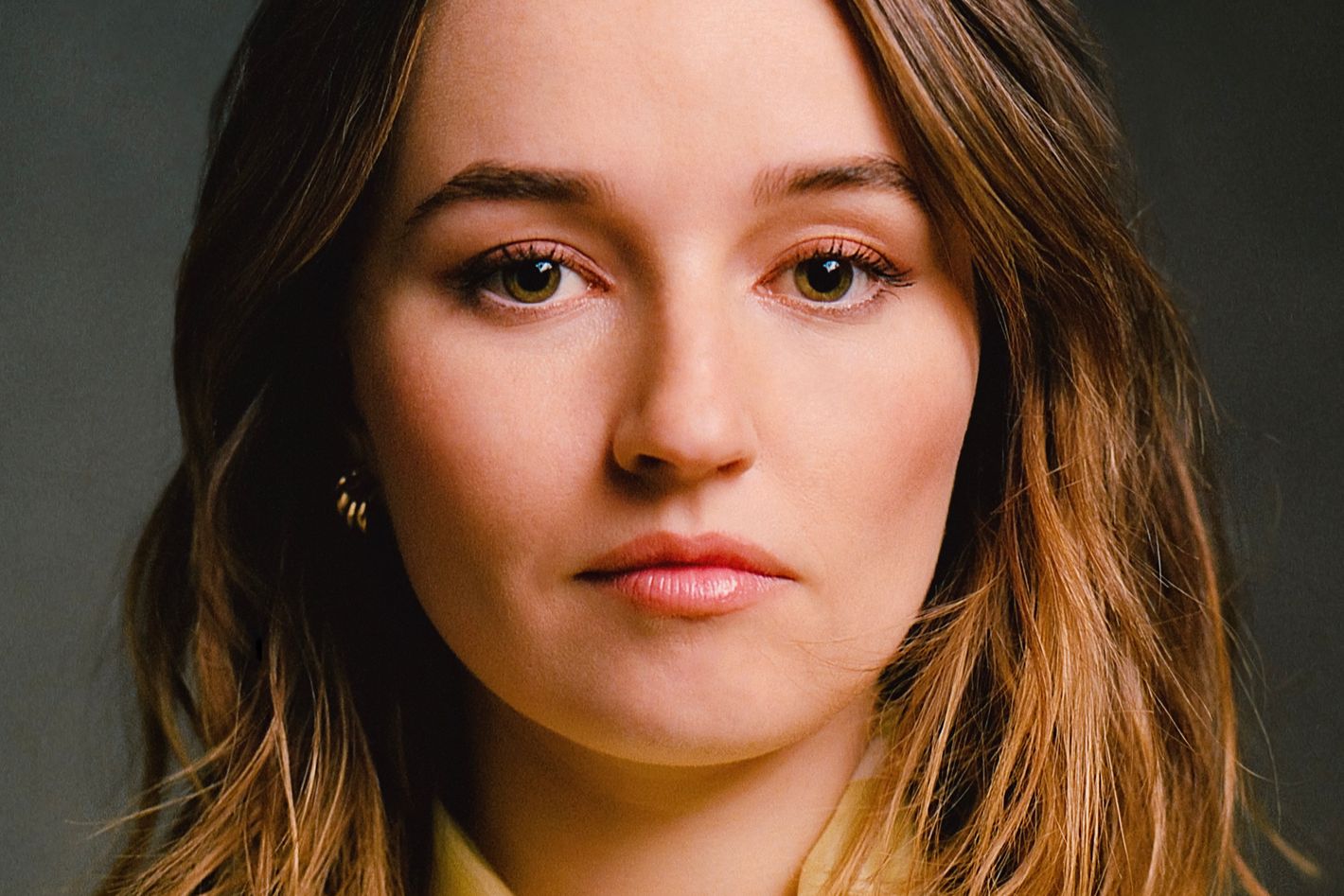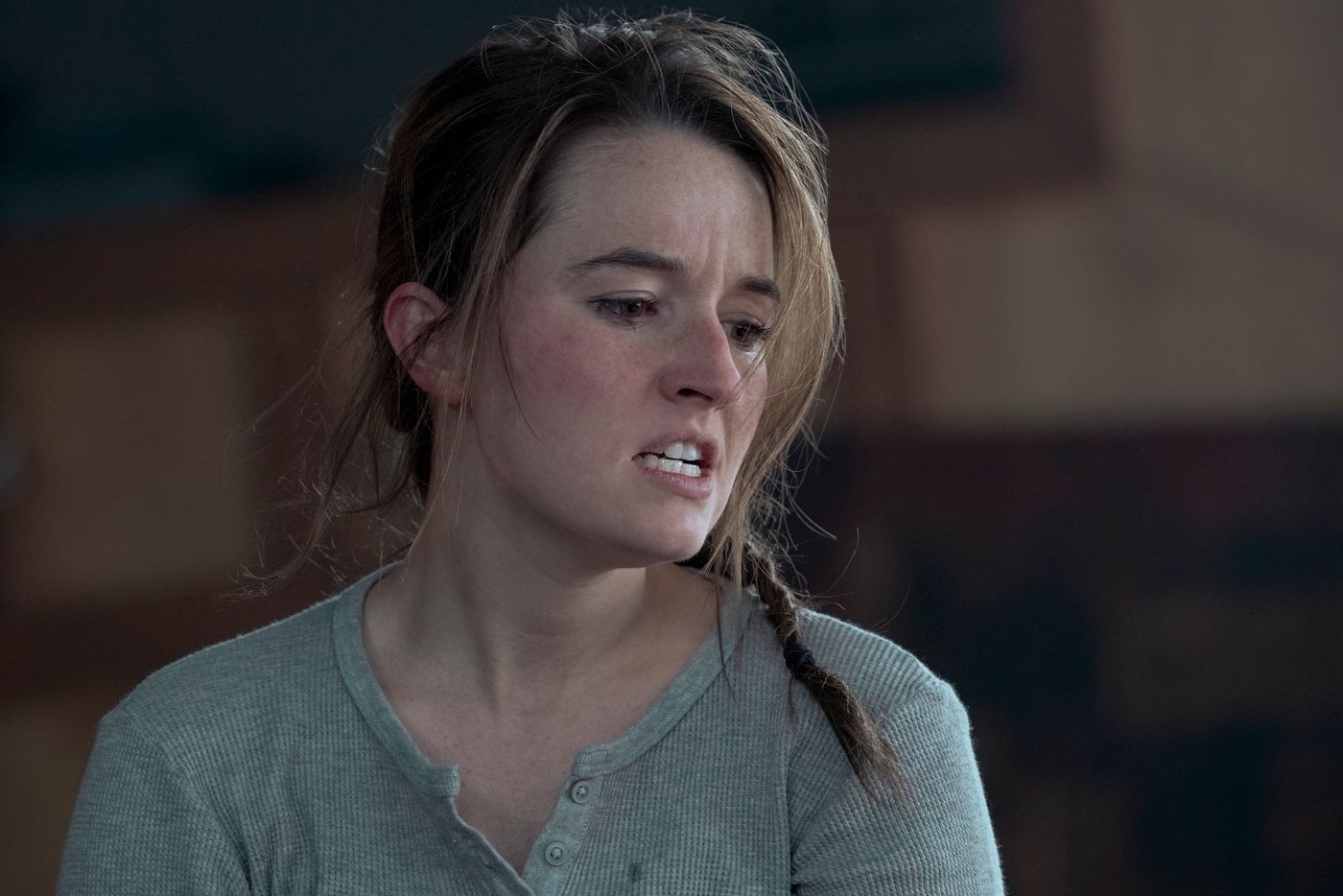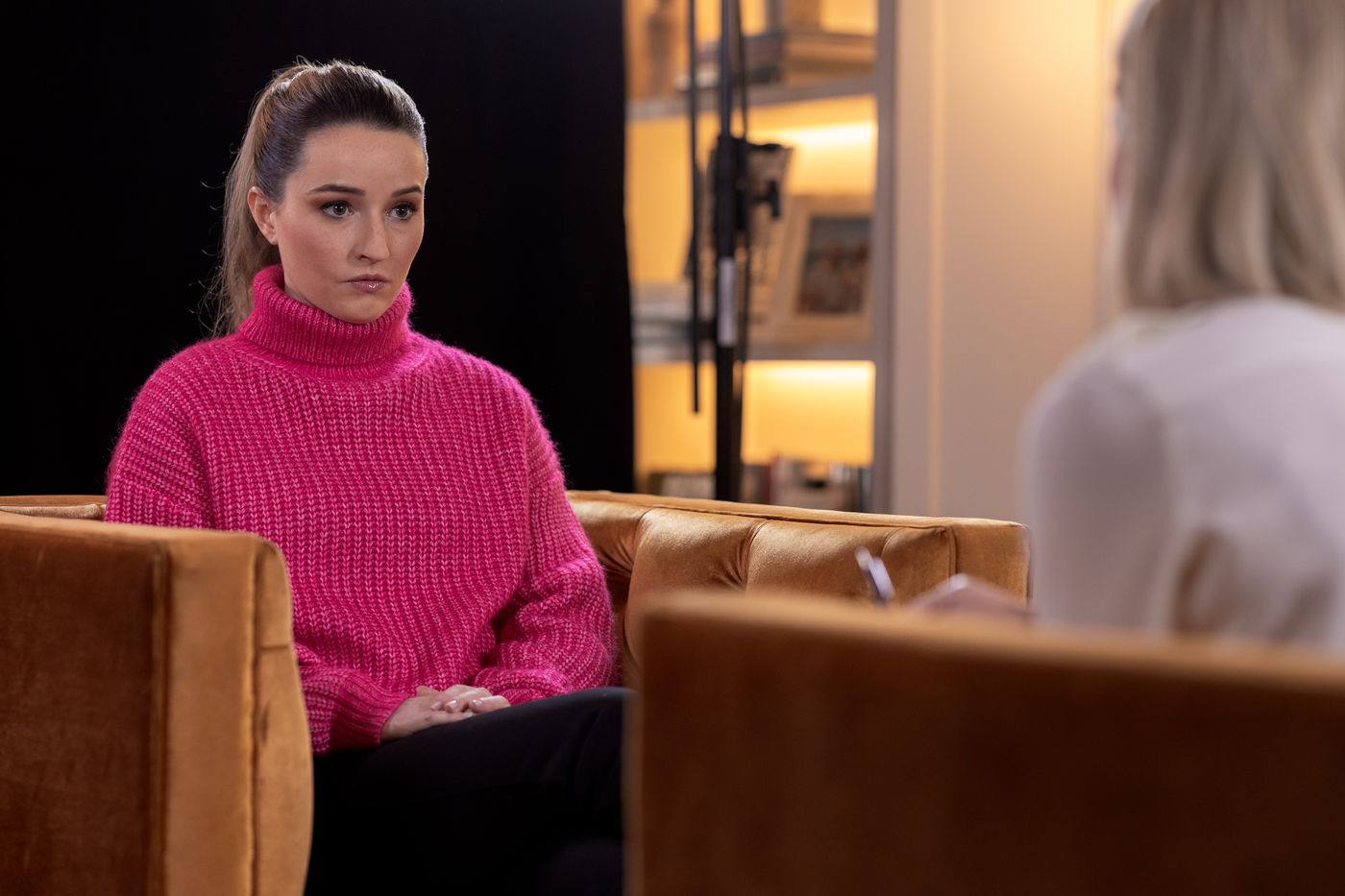
This story contains major spoilers for The Last of Us season two’s second episode, “Through the Valley,” and The Last of Us Part II.
On a rainy March morning in Studio City, Los Angeles, Kaitlyn Dever and I meet up to paint ceramic knickknacks. Dressed in jeans, an oversize sweater, and a ball cap, she approaches the task with all the gravity befitting an eldest daughter who has been a working actor since she the age of 13. She carefully examines every shelf, privately weighing her options before noticing a few unexpected bongs on the top one. “What if I was like, ‘Okay, yeah, that’s what I’m going to do,’” she jokes. She ultimately chooses a doughnut-shaped box, which she opts to paint in Mardi Gras colors. “I’m the most indecisive person, especially when it comes to crafts,” she says. “But I feel like you got to go all out here.”
A few years ago, one of her younger sisters suggested she take up pottery as a hobby. “I spend a lot of time working, and then doing things for work, and then worrying about work and life stuff combined,” Dever says. “My capacity to calm down was sort of gone. She was like, ‘You can just do something for fun.’”
Directly behind our painting station is the Radford Studio Center, where, for a decade, Dever played the tomboyish ROTC member Eve Baxter, Tim Allen’s youngest daughter (and closest ally) on Last Man Standing. During that time, Dever also clocked four seasons on Justified as drug-dealing teen Loretta McCready, and she has worked nearly nonstop since both shows wrapped, most notably opposite Beanie Feldstein in the teen comedy Booksmart and as the star of multiple streaming series, including Unbelievable, Dopesick, and Apple Cider Vinegar. She has developed an impressive range, playing everything from a shy virgin to a wellness scammer to now, on HBO’s prestige franchise The Last of Us, a stone-cold killer. “I’m convinced she’s our Meryl,” says Feldstein.
In assuming the famously maligned role of Abby Anderson in The Last of Us, Dever exposed herself to the wolves. The 2020 sequel to the acclaimed video game on which the series is based takes place in a near-future U.S. ravaged by zombie-type humans infected with a fungus. The first game follows Joel Miller (played by Pedro Pascal in the show) and Ellie (Bella Ramsey) as they travel to Jackson, Wyoming, and begin to assume the roles of father and daughter; Abby enters in the second game, jacked to the gods, and in a Game of Thrones–like twist callously murders Joel, who until then was the protagonist. Players protested the murder and took issue with Abby’s physique, which inspired a gender-essentialist panic in some (male) gamers who claimed she must be transgender. Laura Bailey, the actress who voiced Abby, received vitriolic harassment, including death threats, prompting game developer Naughty Dog to release a statement calling for “a constructive and compassionate discourse.” Dever is aware of what she stepped into; she has read much of what’s been said on Reddit (though she wasn’t offered extra security on set as was previously reported). “I know how iconic this role has been,” she says of Pascal’s Joel. “I want the fans to be proud of what I’ve done with Abby.” She dips her brush in the water bowl and laughs a bit nervously. “And I’m so, so sorry.”
In The Last of Us legend, Abby tortures and murders Joel to avenge the death of her father, Jerry, the lead surgeon of the Firefly rebel militia whom Joel kills to save Ellie’s life. Dever’s Abby follows the game’s brutal trajectory. When we meet her in the season two premiere, she’s strategizing with fellow members of the Fireflies, who become increasingly horrified by her bloodlust. (Through gritted teeth, Abby instructs the group: “We kill him slowly.”) The moment the second episode starts, it’s clear what has to happen and simultaneously hard to believe; even after Abby shoots Joel in the leg, you keep hoping someone, anyone, might intervene. But when Ellie shows up, she’s outnumbered and it’s much too late. It’s an excruciating scene to watch — not least for Dever’s portrayal of bottomless, unresolved grief.
“Abby’s a grieving person; that’s what fuels her anger,” she says. “I could relate to her, and that was a surprise to me because I wasn’t expecting to do those scenes while actually living through grief.” In February 2024, when Dever was working on the series, her mother, Kathy, died of breast cancer. Dever had flown back to see her mom in Los Angeles four days earlier, from Vancouver, where she’d just begun preparation for The Last of Us. “I believed in my mom more than anything,” she says. “I really didn’t think she was going to die. My mom didn’t want to die.” Dever was angry, and on her return to the set three days after her mother’s funeral, she carried that anger with her and put it to work.
Dever’s Abby is slighter than the character’s original depiction; the timing of her mother’s death meant she missed some of the combat and strength training she would have liked to have done. (Kathy was, however, able to see her daughter in action before she died. “The stunt team would edit together these videos of me training,” Dever says. “I probably wasn’t supposed to send that kind of stuff through my phone.”) Her resemblance to the character was never of particular concern to show creators Craig Mazin and Neil Druckmann. “Abby’s physicality in the game had so much to do with differentiating her style of gameplay for the player from Ellie’s style, which is obviously not a consideration for us,” Mazin says. Although a few internet commentators complained about Dever’s slim build ahead of the premiere, they should be chastened by her performance, which is genuinely frightening.

Ignoring the fact that, minutes earlier, Joel saved her from a stampede of deeply infected humans known as “clickers,” Dever’s Abby murders him with blunt force: After rendering him helpless with a bullet to the knee and beating him to a pulp, she descends upon him with a broken shaft of a golf club and stabs his throat — a considerably more ruthless method than Abby uses in the game, in which she bashes his head with the club. Not content with merely executing him, she mocks him throughout, calling him a “lawless piece of shit” and “stupid old man.”
“She had so much time to think about what she was going to do and how she was going to do it,” Dever says. “That’s what she thought was going to be effective for her emotionally, but it didn’t satisfy anything. That’s what’s so heartbreaking about it.” This is plain on Abby’s face in the brief moment she makes eye contact with Ellie.
Dever’s memories of the set are fond if patchy. Her and Pascal’s approach to their scene was “show up and go,” and their working rapport developed instantly. “He’s really good about joking around on set and keeping things fun even though it’s dark material,” she says. “At that time especially, I needed lightheartedness. I just wanted to eat doughnuts and joke around when we weren’t rolling, and that seems like his vibe as well.”
“I could relate very deeply to what she was going through and just wanted her to feel safe above anything else,” Pascal says. Prior to Dever’s first day of shooting, her agent emailed the cast and crew requesting they not bring up her mother’s recent death. “I wanted to be able to be in control of my feelings,” she says, “and they really respected that. It felt like I was being carried through this devastating time in my life by the crew.”
Part of that support included flying members of Dever’s family to the set; her father, a fan of the video game well before his daughter was cast, was there when Dever filmed the dream sequence in which a hardened, present-day Abby warns her younger self not to enter the hospital room where her dead father lies. Dever says that after she finished the scene — in which she screams and sobs for her lost parent — she found her actual father in tears. “He was like, ‘You could have warned me about this one.’”
The scene adds context that the game elides. “She’s sort of wishing she didn’t have to see what she saw,” Dever explains. “The idea of trying to stop herself from going to the other side of that door was really moving. I think it was really important to Craig and Neil that that was shown.” Mazin recalls a moment when Abby turns away from Joel and sees the golf clubs across the room. “She turns back to him, and the truest tear I’ve ever seen just falls right out of her eye,” he says. “And you understand in that moment how profoundly sad she is, even as she’s being cruel. That there’s something she’s killing in herself while this is happening.”
Offscreen, Dever is a realist, maybe more so than any 28-year-old should have to be. Her parents, both former professional ice skaters, raised their three daughters to be resilient. When Dever — herself a competitive child athlete — expressed a desire to act when she was 13, the family relocated to L.A. after having moved from Phoenix to Dallas a few years prior for her work in commercials. But not without a couple of warnings from her mother: School comes first, and rejection is inevitable.
While Dever was growing up, she says, “my mom was almost a bit negative” about her daughter’s prospects in Hollywood: “She was like, ‘You could always get fired.’ So I would always start jobs thinking I was getting fired. A week in, she’d be like, ‘You could still get cut out of it.’ I think it was probably a way of protecting me.”
Around the same time Dever began booking film and television roles, Kathy was diagnosed with stage-four metastatic breast cancer at 39 years old. Dever was 13. Throughout her adolescence, her mother’s illness lent a sense of urgency to the family’s closeness. “Because we knew she was sick and her dying might be a possibility — even though it was something we never really talked about — there was an undertone of, Let’s spend as much time with each other as possible because life is short and it can change.”
In October 2020, Dever shared her mother’s diagnosis on Instagram in recognition of Breast Cancer Awareness Month. By that time, Kathy had been sick for a decade and had tried every treatment available. The following year, her cancer spread significantly, and Dever realized this time was different. “She was going to run out of treatment,” she says. Before, “there was always a new drug for her to try. That’s one cool thing about the medical system is that there’s something new to look toward and try every couple of years.” Until there isn’t.
When her mother’s cancer outlasted all the available conventional medicines, Dever did what so many people do: She looked for more help online. In seeking hope for her mother, her father, her sisters, and herself, she wound up researching alternative “cures” for cancer, scouring the internet for success stories of people who claimed to have gone into remission thanks to green juice and whole foods. “I changed my diet, and I asked my whole family to change their diets so she would also be inspired and we could experience this together with her,” she says. That was before she was approached to play real-life faux-holistic healer Belle Gibson — an Australian influencer who lied about having brain cancer and peddled misinformation about how to cure it — in Netflix’s Apple Cider Vinegar. So when the show’s creator and writer, Samantha Strauss, asked Dever to play Gibson, the timing felt cosmic.
“I was like, ‘No one else knows about coffee enemas!’” she says. “It’s wild how the show came into my life when I already knew too much about this stuff.”

Dever’s mother remembered reading about Gibson’s cancer scam years earlier. She was appalled by Gibson’s actions, Dever says, but thrilled by the part, which Dever performs with uncomfortably palpable insecurity, making the viewer almost feel bad for Gibson. “She read all of the episodes. She was like, ‘You get to do an accent. Who gets asked to do that?’” Still, Dever was hesitant — taking the part would mean flying to Australia, a world away from her mother. She didn’t want to say why, afraid that speaking her worst fear aloud would make it come true. “I was worried she was going to die and I wasn’t going to be home, but I also was like, No, she’s not going to die. It was such a crazy mix of emotions.”
Filming flew by, and Dever was home in time to spend Christmas with her family. In early January of last year, she traveled back to Melbourne to finish shooting Apple Cider Vinegar. The day she left, her mother was admitted to the hospital. The next two months blur together in Dever’s memory because as she was wrapping the Netflix show in Australia and preparing to film The Last of Us, her mother was dying. “I thought I had so much control over my mom’s health,” she says. Her hope lasted until the very end. “I remember calling Beanie at four o’clock in the morning, and she just so happened to be up for a flight. I was asking her about certain doctors she knew that maybe could help us out at the last minute — and that was the night she died.”
It took finishing work on The Last of Us for Dever’s grief to catch up with her. First, she got a mysterious overnight spider bite, which had to be CGI-ed off her face in some scenes. After a second unexplained facial infection, Dever’s dermatologist gave her a talking-to. “She was like, ‘Okay, let’s look at what’s actually going on here. Are you sleeping?’ ‘No.’ ‘Are you eating well?’ ‘No, not really. I’m eating poorly and drinking sugar.’”
After The Last of Us, she checked off two milestones at once: living alone and in New York City for a few months. On the recommendation of the dermatologist, she spent hours walking aimlessly. “New York moves you forward,” Dever says. “I was forced outside of my apartment, and that was something I knew I needed. I was like, Okay, I have a chunk of time now to just be with myself and my thoughts and explore a new place.” She also spent a “very healing” weekend upstate and in the Berkshires with Feldstein paddleboarding and taking an embroidery class. With time, she has gained perspective from her mother’s death. “Certain things I used to get really nervous about or worry about, I don’t anymore,” she says. “Things became so much smaller when she passed.”
Production Credits
Photographs by Zachary Scott
,
Styling by Katie Bofshever
,
Hair by LaRae Burress
,
Makeup by Yvettra Grantham
Related
- The Last of Us’s New Beginning
- The Last of Us Recap: Truth and Consequences
- The Video Game Version of Abby Anderson Thinks HBO Made a Wise Choice
What Kaitlyn Dever does in The Last of Us is devastating. It’s nothing compared to what was happening behind the scenes.

































































